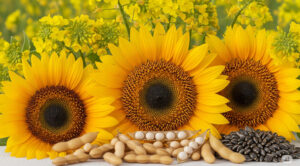
Foreign exchange earnings from rapeseed oil exports from Ukraine in the second half of 2025 increased 2.2 times compared to the same period of the previous season, while rapeseed meal revenues increased 1.4 times, according to Dmytro Kysilevsky, deputy chairman of the Verkhovna Rada Committee on Economic Development, citing data from the Ukroliyaprom association.
“The introduction of a 10% export duty on soybeans and rapeseed has allowed Ukraine to increase the production of oil and meal from these raw materials, as well as to increase exports of processed products,” he wrote on Facebook.
According to the association’s data, in July-December 2025, rapeseed processing into oil increased 1.8 times. In the soybean segment, in September-December 2025, oil production increased by 22.4%, exports by 23.3%, and foreign exchange earnings by 1.5 times.
“The processing of soybeans into oil and meal exceeded its exports by 3.7%,” the parliamentarian emphasized.
Ukroliyaprom predicts that in the 2025-2026 marketing year (MY, July-June), rapeseed processing will reach a record 1.7 million tons (over 50% of the gross harvest), and soybeans — 3.0 million tons (over 60%). This will ensure the production of 720,000 tons of rapeseed oil and 600,000 tons of soybean oil.
Kysilevsky emphasized that the processing model proved its effectiveness in the very first season of the duty law, providing billions of hryvnias in taxes. He also recalled the support programs “Made in Ukraine,” in particular, “5-7-9” loans and 25% compensation for the cost of agricultural machinery.
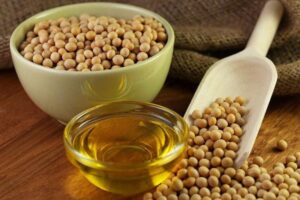
The US International Development Finance Corporation (DFC) approved a $40 million loan agreement for a 10-year term for one of the subsidiaries of Ukraine’s largest sugar producer, Astarta Agricultural Holding.
“DFC will co-finance with the International Finance Corporation capital investments and operating expenses related to the construction of a soybean protein concentrate (SPC) plant,” the agricultural holding company said.
According to Vyacheslav Chuk, director of commercial operations and strategic marketing at the agricultural holding, in September 2025, Astarta intends to continue investing in the construction of its soy protein concentrate plant in 2026, with investments amounting to approximately EUR 40 million.
In 2024, Astarta began investing in the construction of a plant for processing soybean meal into soy protein concentrate with a capacity of 500 tons/day (approximately 100,000 tons/year) in the Hlobyn Industrial Complex (Poltava region). The agricultural holding will invest over EUR 76 million in the purchase of equipment and technologies and will create 110 new jobs.
Astarta and its structural unit Astarta Agro Protein signed the first investment agreement with the Ukrainian government to receive compensation from the state for significant investments. Under the agreement, the state will provide the agricultural holding with a number of incentives, including exemption from import duties on new equipment, import VAT on new equipment, and income tax for up to five years.
Astarta is a vertically integrated agro-industrial holding company operating in eight regions of Ukraine and is the largest sugar producer in Ukraine. It comprises six sugar factories, agricultural enterprises with a land bank of 220,000 hectares, dairy farms with 22,000 head of cattle, an oil extraction plant in Hlobyn (Poltava region), seven elevators, and a biogas complex.
In the first half of 2025, Astarta reduced its net profit by 10.3% to EUR47.11 million, and its consolidated revenue decreased by 29.3% to EUR320.71 million.
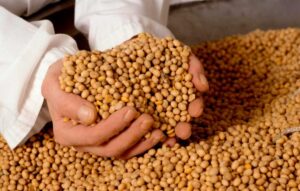
The Cabinet of Ministers has adopted a resolution introducing a mechanism for monitoring soybean and rapeseed exports, according to the press service of the Ministry of Economy, Environment, and Agriculture.
“We are introducing a transparent mechanism that allows producers, rather than intermediaries, to be exempt from export duties. The funds that the state will receive from traders’ duties will replenish a special budget fund and will be directed to programs to support frontline territories, where farmers work in the most difficult conditions, grants for processing, greenhouses, orchards, and insurance against military risks,” said Deputy Minister of Economy, Environment, and Agriculture Taras Vysotsky, whose words are quoted in a statement on the ministry’s website.
The Ministry of Economy noted that the document aims to ensure the fair application of export duty exemptions for certain categories of agricultural producers.
The new procedure establishes a monthly monitoring mechanism to be implemented by the Ministry of Economy to verify the compliance of exported product volumes with the data contained in the State Agrarian Register (SAR) regarding the actual products grown. If discrepancies are found between the declared and actual volumes grown, the Ukrainian Chamber of Commerce and Industry is obliged to cancel the expert conclusions.
“The introduction of such a mechanism ensures that only those exporters who have actually grown the products themselves will benefit from the exemption from export duties,” the ministry added.
The resolution ensures transparent and fair administration of the export duty exemption, prevents abuse during the export of soybeans and rapeseed, provides equal and fair conditions of competition for agricultural producers, and ensures state support for farmers, as only traders, not producers, will pay the duty, the statement said.
The government’s decision is expected to strengthen state control, ensure targeted budget revenues, and contribute to the stability of the agricultural sector. Monitoring will make it possible to simultaneously support conscientious producers and guarantee the replenishment of a special fund for the implementation of key agricultural development programs.
As reported, in September 2025, a law was passed introducing a 10% export duty on soybeans and rapeseed. Agricultural producers and cooperatives that export their own products are exempt from paying the duty. The duty is paid by traders and other exporters who are not producers. The mechanism is aimed at supporting farmers, stimulating domestic processing, and filling a special state budget fund to finance agricultural programs.
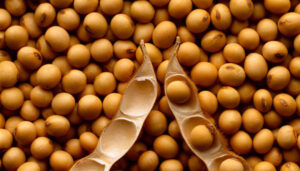
The tenth annual meeting of the Ukraine-EU Association Committee in Trade (ACTA) was held in Brussels, where issues related to Ukraine’s export duties on soybeans and rapeseed, as well as temporary restrictions on the export of unprocessed timber, were discussed, according to the Ministry of Economy, Environment, and Agriculture.
Ukraine informed its partners that a 10% export duty on soybeans and rapeseed was introduced in 2025 to support the development of agricultural processing within the country. At the same time, agricultural producers who export their own products are completely exempt from paying duties. Therefore, the mechanism introduced does not create additional financial costs for them.
“It is precisely through the proceeds from export duties on soybeans and rapeseed that the state will fill a special budget fund, from which programs to support agricultural producers are financed. First and foremost, these are programs for frontline territories, as well as grants for processing, greenhouses, orchards, compensation for agricultural equipment, insurance against military risks, and other key instruments. This allows us to maintain support for farmers even in wartime,” emphasized Deputy Minister of Economy, Environment, and Agriculture Taras Vysotsky.
The meeting participants also discussed decisions on regulating timber exports, including a temporary ban on the export of unprocessed timber (except pine) and the establishment of zero quotas until the end of 2025.
The Ukrainian side stressed that these measures are aimed at meeting the needs of defense and critical infrastructure, as well as reducing risks to the environment in wartime. At the same time, these measures prevent a shortage of raw materials on the domestic market.
It was separately noted that the Verkhovna Rada of Ukraine is considering draft laws on the formation of an updated timber market model, taking into account security challenges.
The Ukrainian side stressed the importance of continuing an open dialogue with the EU on all temporary measures that the state is applying during the period of martial law. At the same time, maintaining access for Ukrainian products to the European market remains one of the key factors for economic stability and support for national production.
The Ukraine-EU Association Committee in Trade Composition (ACTC) was established in accordance with Article 465 (4) of the Association Agreement between Ukraine and the EU to consider issues related to Section IV “Trade and Trade-Related Matters” of the Association Agreement. The CATS operates in accordance with the rules of procedure approved by Decision No. 1/2014 of the Association Council between Ukraine and the EU of 15 December 2014 “On the adoption of the rules of procedure of the Association Council, the Association Committee and its subcommittees”.
The Trade Committee meets annually and includes representatives from Ukraine and the European Commission.
As reported, a 10% export duty on soybeans and rapeseed for traders has been in effect in Ukraine since September 4, 2025. Agricultural producers who export their own products, or agricultural cooperatives that export the products of their members, are exempt from this duty, provided that the origin of the goods is documented. Until 2030, the duty will be reduced by 1% each year until it reaches 5%.
The Cabinet of Ministers has temporarily banned the export of unprocessed wood (except pine) until December 31, 2025, setting a zero quota for its export. This is done to provide the domestic market with raw materials, support Ukrainian woodworking enterprises, and stabilize the industry.

During the full-scale invasion, Ukraine commissioned 3 million tons of oilseed processing capacity, with the same amount planned and under construction, so there were underutilized enterprises in the country, said Minister of Economy, Environment, and Agriculture Oleksiy Sobolev in an interview with Forbes Ukraina.
“In September, rapeseed oil exports increased 4.5 times compared to August, turning raw material exports into processed products. The state receives a fiscal effect from duties on soybeans and rapeseed, the proceeds of which are directed to a special fund to support the agricultural sector, in particular the frontline territories, i.e., the main goal of the duty is being achieved,” he commented on the results of the introduction of a 10% export duty on soybeans and rapeseed.
The minister noted that to ensure the proper functioning of this mechanism, the government adopted an experimental resolution stipulating that producer-exporters do not pay duties like the rest. In particular, the resolution specifies the method by which a producer confirms that they have grown a particular crop and are entitled to exemption from duties.
In addition, Ukraine is introducing monitoring through the State Agrarian Register to form a unified system of soybean and rapeseed exporters.
Sobolev added that a mechanism for exchanging information between customs and tax authorities is currently being developed with a view to transitioning to an automatic mode in the future. This will be an IT solution, similar to the electronic VAT administration system (SEA VAT), which will be operational by September 2026.
“After the end of the marketing years, we will be able to evaluate the results. Preliminary data already indicate an increase in the share of domestic processing of rapeseed and soybeans,” the Minister of Economy concluded.
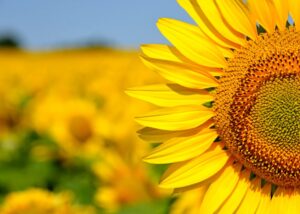
The Ristone Holdings agricultural group is completing the harvest on an area of about 38,000 hectares and is simultaneously finishing sowing winter crops, for which it has allocated 26,800 hectares, the agricultural holding’s press service reported on Facebook.
“Sunflowers were the main crop of this year’s harvest. As planned in the spring, 29,000 hectares were sown with this strategically important and highly profitable crop. As of today, the sunflower harvest from these areas has been completely completed,” the agricultural group stated.
In addition, the holding’s farmers harvested 5.5 thousand hectares of corn and 350 hectares of soybeans, thus completing the 2025 harvesting campaign.
In parallel with the harvest, Ristone Holding farms prepared the soil for the 2026 sowing campaign. The fields were plowed for winter crops, which is a key agronomic measure for moisture accumulation, soil structure improvement, and weed and pest control. The final stage of the autumn work was the sowing of winter crops, which is currently in its final stages.
For the 2026 harvest, the agricultural holding sowed 23,000 hectares with winter wheat and 3,800 hectares with winter rapeseed.
The Ristone Holdings group of companies is a vertically integrated agricultural holding company, which includes: Dnipromlyn LLC, Bakery No. 10 LLC, Orilsky United Elevator LLC, Agrofirma Orilskaya LLC, Agroalliance LLC, Agrofirma Victoria State Enterprise, Agrofirma im. Gorkogo LLC, Zlagoda Agricultural Production Cooperative, etc.
Ristone Holdings cultivates 65,800 hectares in the Dnipropetrovsk, Kharkiv, and Zaporizhzhia regions. It is engaged in the cultivation of grain and industrial crops, animal husbandry, production, and wholesale and retail trade in agricultural products, including flour, bread, bakery products, etc.
The founder and chairman of the supervisory board of Ristone Holdings is Vadym Nesterenko.